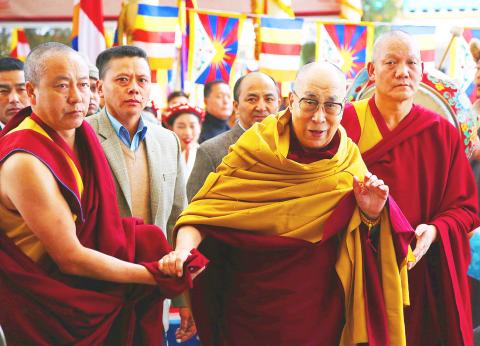Tibetan advocates yesterday joined New Power Party (NPP) Legislator Freddy Lim (林昶佐) in launching a petition to invite the Dalai Lama to visit Taiwan this year, and urged civic organizations, religious groups and the public to help make it happen.
The initiative was announced at the beginning of a march in Taipei to commemorate the 60th anniversary of the Tibetan Uprising.
“This is the best way to show to the world that Taiwan is different from China,” Lim said, adding that he hopes all Taiwanese would join the drive.

Photo: EPA-EFE
“A visit from the Dalai Lama would only focus on religion, as he is the spiritual leader of the Tibetan people and the followers of Tibetan Buddhism. He would be coming to promote religious teaching and to interact with other faiths in Taiwan,” he said. “Therefore the petition is based on efforts by ordinary people, non-governmental organizations and religious groups, and is not led by our party.”
Lim said the aim is for the visit to take place before the year ends.
NPP Chairman Chiu Hsien-chih (邱顯智) yesterday urged Taiwanese to support the petition.
“This can be our collective message to the world, that Taiwanese are standing together with those who are suffering due to the brutality and atrocities committed by the Chinese government,” he said.
Democratic Progressive Party (DPP) Secretary-General Luo Wen-jia (羅文嘉), who also participated in the march, said: “We welcome the Dalai Lama making a trip to Taiwan. He should have the freedom and the right to go wherever he wants — even to his homeland.”
Tibet Religious Foundation of His Holiness the Dalai Lama chairman Dawa Tsering said he and many Tibetans in Taiwan would be elated if the visit happened.
“However, we do not want to make trouble for the DPP government... It would be up to the government to decide,” he said.
The Dalai Lama has expressed his desire to visit Taiwan again, so it could happen, he said, adding that the Nobel Peace Prize laureate has three reasons for doing so.
First, the Dalai Lama would conduct special blessing ceremonies and solemn dharma services to fulfill the spiritual needs of Tibetan Buddhists in Taiwan, as it has been 10 years since he last visited Taiwan in 2009, Tsering said.
Second, the Dalai Lama wants to foster exchanges with other religious bodies in Taiwan, and bring messages of peace and compassion for all of humanity, Tsering said.
Third, the Dalai Lama has been focusing on encouraging mutual understanding between religious figures and scientists, Tsering said, adding that in November last year, he hosted a conference in Dharamsala, India, to discuss quantum physics.
At that event, the Dalai Lama presided over a session with Nobel laureate Lee Yuan-tseh (李遠哲), who headed a delegation from Taiwan’s science community.
At that dialogue, the Dalai Lama said Taiwan would be the best place for dialogue with scientists from the Chinese-speaking world.

PREPAREDNESS: Given the difficulty of importing ammunition during wartime, the Ministry of National Defense said it would prioritize ‘coproduction’ partnerships A newly formed unit of the Marine Corps tasked with land-based security operations has recently replaced its aging, domestically produced rifles with more advanced, US-made M4A1 rifles, a source said yesterday. The unnamed source familiar with the matter said the First Security Battalion of the Marine Corps’ Air Defense and Base Guard Group has replaced its older T65K2 rifles, which have been in service since the late 1980s, with the newly received M4A1s. The source did not say exactly when the upgrade took place or how many M4A1s were issued to the battalion. The confirmation came after Chinese-language media reported

The Taiwanese passport ranked 33rd in a global listing of passports by convenience this month, rising three places from last month’s ranking, but matching its position in January last year. The Henley Passport Index, an international ranking of passports by the number of designations its holder can travel to without a visa, showed that the Taiwan passport enables holders to travel to 139 countries and territories without a visa. Singapore’s passport was ranked the most powerful with visa-free access to 192 destinations out of 227, according to the index published on Tuesday by UK-based migration investment consultancy firm Henley and Partners. Japan’s and

A Ministry of Foreign Affairs official yesterday said that a delegation that visited China for an APEC meeting did not receive any kind of treatment that downgraded Taiwan’s sovereignty. Department of International Organizations Director-General Jonathan Sun (孫儉元) said that he and a group of ministry officials visited Shenzhen, China, to attend the APEC Informal Senior Officials’ Meeting last month. The trip went “smoothly and safely” for all Taiwanese delegates, as the Chinese side arranged the trip in accordance with long-standing practices, Sun said at the ministry’s weekly briefing. The Taiwanese group did not encounter any political suppression, he said. Sun made the remarks when

BROAD AGREEMENT: The two are nearing a trade deal to reduce Taiwan’s tariff to 15% and a commitment for TSMC to build five more fabs, a ‘New York Times’ report said Taiwan and the US have reached a broad consensus on a trade deal, the Executive Yuan’s Office of Trade Negotiations said yesterday, after a report said that Washington is set to reduce Taiwan’s tariff rate to 15 percent. The New York Times on Monday reported that the two nations are nearing a trade deal to reduce Taiwan’s tariff rate to 15 percent and commit Taiwan Semiconductor Manufacturing Co (TSMC, 台積電) to building at least five more facilities in the US. “The agreement, which has been under negotiation for months, is being legally scrubbed and could be announced this month,” the paper said,